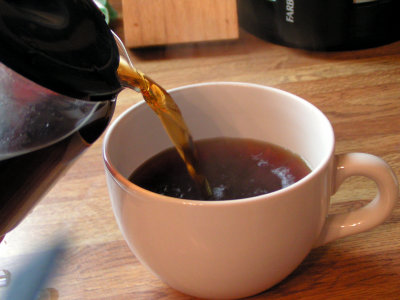It turns out that drinking more than 3 cups of coffee per day is likely to cause migraine

by
Migraine is accompanied by pulsating pain and vomiting, and sometimes the head is so painful that it becomes so severe that nothing can be handled. Since many people believe the theory that `` drinking caffeine-containing drinks causes migraine '', researchers actually investigated the relationship between caffeinated drinks and migraine, `` 1 “Up to 1 or 2 caffeinated drinks a day is safe, but 3 or more drinks increase the risk of migraine.”
Prospective Cohort Study of Caffeinated Beverage Intake as a Potential Trigger of Headaches among Migraineurs-The American Journal of Medicine
https://www.amjmed.com/article/S0002-9343(19)30210-4/fulltext
Trigger Warning: One to Two Servings of Caffeinated Beverages Not Associated with Higher Risk of Migraine Headaches but Three or More May Trigger Migraines | BIDMC of Boston
https://www.bidmc.org/about-bidmc/news/2019/08/one-to-two-servings-of-caffeinated-beverages-not-associated-with-higher-risk-of-migraine-headaches
There are over 1 billion people worldwide who suffer from migraine, making it the third most common disease in the world. Many people are wondering what causes migraine, and various factors such as weather, sleep disturbances, hormonal imbalances, and stress have been reported to cause migraine. There is also a strong theory that caffeine intake causes migraine, but there are few studies that actually investigated the relationship between caffeine intake and migraine.
A research team led by Elizabeth Mostovsky of Beth Israel Deacones Medical Center , a teaching hospital in partnership with Harvard Medical School, investigated whether caffeinated beverages could trigger migraine.
Mostovsky said, “Some triggers, such as lack of sleep, just cause migraine, but the role of caffeine is more complex than that because caffeine is suspected to induce migraine. It also helps reduce the pain of migraine. '

by
The research team targeted 98 adults who developed migraine at a `` moderate frequency '' of 2 to 15 times a month, and the intake status of caffeinated drink over 6 weeks and the timing of migraine occurrence And a report on how to deal with it. Participants also reported information related to migraine such as drug use, alcohol consumption, depressive symptoms, psychological stress, sleep patterns, and menstrual cycle. Based on this report, the research team analyzed the relationship between caffeinated beverage consumption and the frequency of migraine headaches on that day and the next day.
In this study, 8 ounces (about 226 g) coffee, 6 ounces (about 170 g) tea, 12 ounces (about 340 g) caffeinated carbonated drinks, 2 ounces (about 57 g) energy drinks as `` one cup '' count. By analyzing the intake frequency of caffeinated beverages and the incidence of migraine for each participant, the association between caffeine and migraine was examined regardless of personal conditions and demographics. The research team also tried to find out the effect of caffeinated beverages on migraine as much as possible, eliminating errors on each day of the week such as weekdays or holidays.
As a result, the research team said, “Ingestion of one or two caffeine drinks per day does not affect the occurrence of migraine, but if the frequency of intake exceeds“ three cups per day ”, the migraine on the current day and the next day Found that the probability of occurrence increases. In addition, among those who rarely consume caffeinated beverages, one or two caffeinated beverages a day can cause migraines.
“In this study, the caffeine content per serving varies from 25 to 150 mg, so we cannot quantify the amount of caffeine that causes migraine,” says Mostovsky. He pointed out that this result is an important one that shows the relationship between migraine and caffeinated beverages. While many migraine patients are at risk of caffeinated beverages, it is also very interesting that one or two servings per day does not increase the risk of migraine.

by StockSnap
Related Posts:







